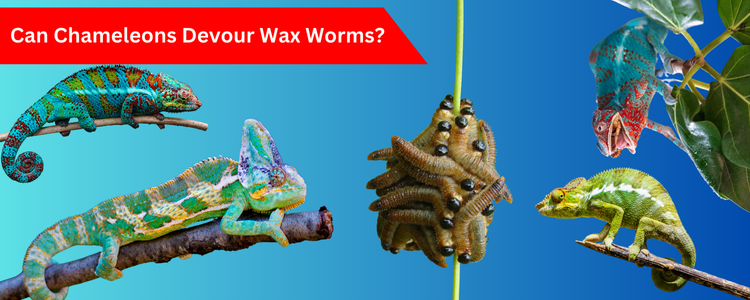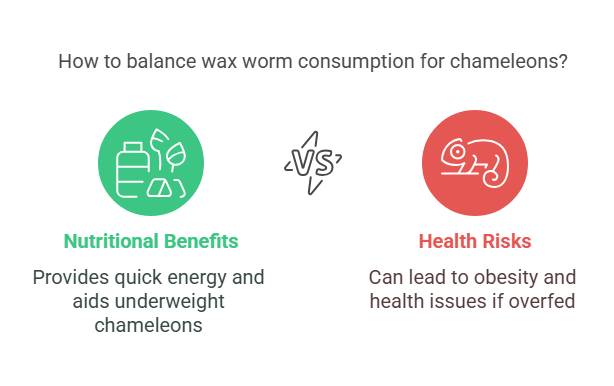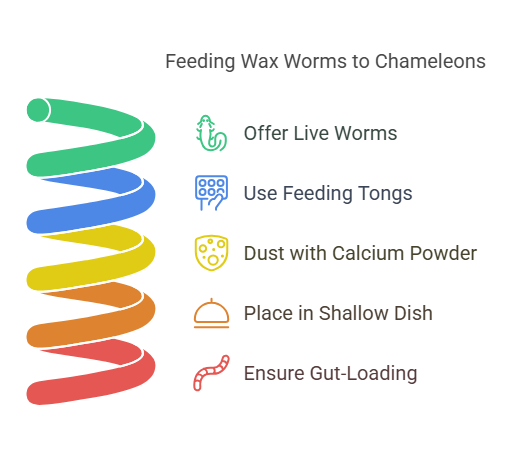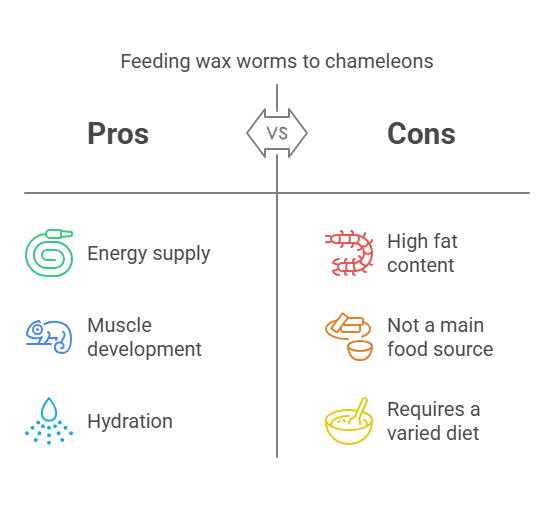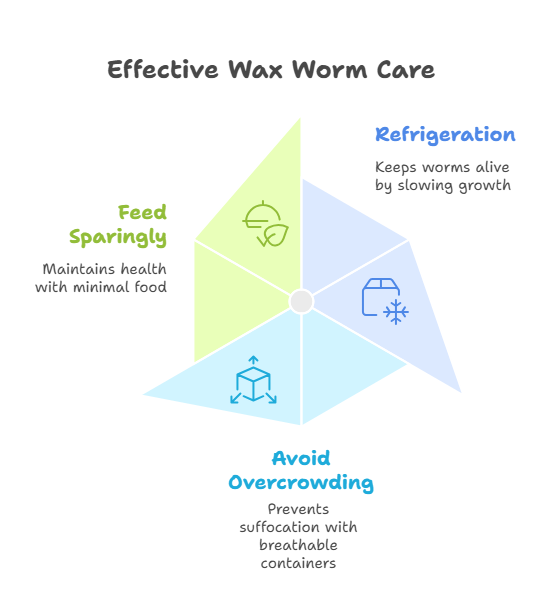Absolutely, chameleons can enjoy wax worms as a treat! Wax worms are soft-bodied and nutritious, making them a good snack for chameleons. However, feeding them in moderation is important due to their high-fat content. But what about their diet? Can chameleons devour wax worms? Let’s dive into the details.
Are Wax Worms Safe for Chameleons?
Yes, wax worms are safe for chameleons. These soft-bodied larvae are a popular choice among reptile enthusiasts due to their high fat content and ease of digestion. They provide a quick energy boost for your pet and can be particularly useful for underweight or sick chameleons. However, they should not make up the bulk of your chameleon’s diet. Too many wax worms can lead to obesity and other health problems.
According to veterinarians,
“A balanced diet is key for reptile health” (source).
What Are Wax Worms, Exactly?
Wax worms are the larvae of the greater wax moth (Galleria mellonella). They naturally thrive in beehives, where they feed on beeswax and honey. In captivity, they are raised on a diet of bran and honey, making them a nutrient-rich food source for reptiles. Their soft bodies make them an appealing treat for chameleons, as they are easy to swallow and digest.
80% of a chameleon’s diet should consist of staple feeders like crickets, dubia roaches, or silkworms
Nutritional Benefits of Wax Worms
Wax worms are packed with nutrients that can benefit chameleons when offered in moderation:
- Fat: Supplies energy for active chameleons and helps underweight pets regain weight.
- Protein: Aids in muscle development and growth.
- Moisture: Contributes to hydration, especially for chameleons that may not drink water frequently.
Despite these benefits, the high fat content of wax worms means they should be considered more of a dessert than a main course. A varied diet is crucial to ensure your chameleon receives all the necessary vitamins and minerals.
How Often Should Chameleons Eat Wax Worms?
Moderation is crucial when feeding wax worms to your chameleon. They are best offered as treats or occasional supplements rather than as a primary food source. Here are some general guidelines:
- Juvenile chameleons: Once a week as part of a varied diet.
- Adult chameleons: Once every two weeks or as an occasional reward.
Overfeeding wax worms can lead to obesity and nutritional deficiencies. Always monitor your chameleon’s weight and adjust their diet as needed.
Do All Chameleons Like Wax Worms?
Not all chameleons will take to wax worms immediately. Some may prefer more active prey like crickets or dubia roaches. If your chameleon refuses wax worms, don’t worry. Experiment with different feeding techniques to see what works best. Offering live wax worms on feeding tongs or in a shallow dish can stimulate your chameleon’s hunting instincts.
Dr. Susan Brown, a reptile specialist, states,
“Variety is essential in a chameleon’s diet. Treats like wax worms can supplement a well-balanced feeding plan, but they should never replace staple feeders”
How to Feed Wax Worms to Chameleons
Here are the steps to safely feed wax worms to your chameleon:
- Offer live worms: Chameleons are natural hunters and are more likely to eat moving prey.
- Use feeding tongs: This allows for precise placement and prevents worms from escaping.
- Dust with calcium powder: Calcium is essential for bone health. Dusting worms ensures your chameleon gets enough of this vital nutrient.
- Place in a shallow dish: If you prefer hands-off feeding, use a shallow, escape-proof dish to offer the worms.
Make sure the wax worms you offer are gut-loaded. This means they should be fed nutrient-rich food, such as fruits or grains, before being given to your chameleon. Gut-loading enhances the nutritional value of the worms.
Pros and Cons of Wax Worms for Chameleons
Pros:
- Soft texture: Easy to digest for chameleons of all ages.
- High palatability: Most chameleons find them irresistible.
- Rich in energy: Ideal for underweight or recovering pets.
Cons:
- High fat content: Can lead to obesity if overfed.
- Low in calcium: Requires supplementation.
- Short shelf life: Wax worms can spoil if not stored properly.
Wax Worm Storage Tips
To keep wax worms fresh and healthy for your chameleon, follow these storage tips:
- Refrigeration: Store wax worms in a refrigerator set to 50-60°F. This slows their growth and keeps them alive longer.
- Avoid overcrowding: Use a spacious container with breathable holes to prevent the worms from suffocating.
- Feed them sparingly: If storing them for an extended period, provide small amounts of bran or honey to maintain their health.
Proper storage ensures that the worms stay active and nutritious, making them a better treat for your pet.
Additional Insights on Chameleon Care
Chameleons are sensitive creatures. Their health relies heavily on proper diet, hydration, and environmental conditions. While wax worms can be a great occasional treat, other factors play a role in their overall well-being:
- UVB Lighting: Essential for vitamin D3 synthesis and calcium absorption.
- Hydration: Chameleons often drink water droplets from leaves. Ensure their enclosure is misted regularly.
- Varied Diet: Include a mix of insects like crickets, roaches, and silkworms.
By addressing these aspects, you can ensure your chameleon remains healthy and happy.
Frequently Asked Questions
1. Can chameleons eat wax worms daily?
No, wax worms are too fatty for daily feeding. Use them as treats.
2. Are wax worms better than mealworms?
Wax worms are softer and easier to digest. Mealworms have tougher exoskeletons, which can be harder for chameleons to process.
3. What size wax worm is best for my chameleon?
Choose worms smaller than the space between your chameleon’s eyes. This prevents choking and ensures safe consumption.
4. Can wax worms cause digestive issues?
Not if fed in moderation. Overfeeding can lead to weight gain and associated problems like fatty liver disease.
5. Where can I buy fresh wax worms?
Reputable pet stores and online retailers often carry wax worms. Look for active, plump worms to ensure freshness.
Final Thoughts
Wax worms can be a tasty treat for chameleons. They’re nutritious but should be given in moderation. A varied diet ensures your pet stays healthy and active. Treat your chameleon to wax worms occasionally, but focus on staple feeders for their primary meals.

